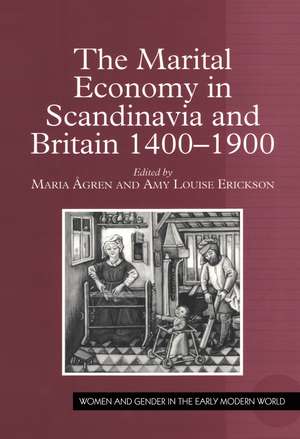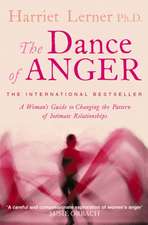The Marital Economy in Scandinavia and Britain 1400–1900: Women and Gender in the Early Modern World
Autor Maria Ågren Editat de Amy Louise Ericksonen Limba Engleză Paperback – 17 feb 2005
Din seria Women and Gender in the Early Modern World
-
 Preț: 225.10 lei
Preț: 225.10 lei - 19%
 Preț: 364.64 lei
Preț: 364.64 lei - 9%
 Preț: 1003.31 lei
Preț: 1003.31 lei -
 Preț: 289.10 lei
Preț: 289.10 lei - 8%
 Preț: 397.61 lei
Preț: 397.61 lei - 18%
 Preț: 1054.71 lei
Preț: 1054.71 lei - 18%
 Preț: 1004.68 lei
Preț: 1004.68 lei - 18%
 Preț: 1054.71 lei
Preț: 1054.71 lei - 18%
 Preț: 1055.06 lei
Preț: 1055.06 lei - 26%
 Preț: 764.20 lei
Preț: 764.20 lei - 26%
 Preț: 764.20 lei
Preț: 764.20 lei - 18%
 Preț: 1001.84 lei
Preț: 1001.84 lei - 18%
 Preț: 1000.27 lei
Preț: 1000.27 lei - 25%
 Preț: 497.08 lei
Preț: 497.08 lei - 18%
 Preț: 1000.27 lei
Preț: 1000.27 lei - 18%
 Preț: 1056.63 lei
Preț: 1056.63 lei - 28%
 Preț: 826.01 lei
Preț: 826.01 lei - 18%
 Preț: 1053.92 lei
Preț: 1053.92 lei - 25%
 Preț: 768.30 lei
Preț: 768.30 lei - 28%
 Preț: 819.48 lei
Preț: 819.48 lei - 18%
 Preț: 1113.63 lei
Preț: 1113.63 lei - 25%
 Preț: 767.07 lei
Preț: 767.07 lei - 31%
 Preț: 766.99 lei
Preț: 766.99 lei - 18%
 Preț: 1058.69 lei
Preț: 1058.69 lei -
 Preț: 369.73 lei
Preț: 369.73 lei - 16%
 Preț: 234.90 lei
Preț: 234.90 lei - 18%
 Preț: 1061.81 lei
Preț: 1061.81 lei - 31%
 Preț: 766.85 lei
Preț: 766.85 lei - 18%
 Preț: 1060.25 lei
Preț: 1060.25 lei - 28%
 Preț: 735.34 lei
Preț: 735.34 lei - 18%
 Preț: 1000.27 lei
Preț: 1000.27 lei - 18%
 Preț: 1061.81 lei
Preț: 1061.81 lei - 18%
 Preț: 1061.06 lei
Preț: 1061.06 lei - 28%
 Preț: 876.07 lei
Preț: 876.07 lei - 18%
 Preț: 1064.70 lei
Preț: 1064.70 lei - 18%
 Preț: 1107.61 lei
Preț: 1107.61 lei - 26%
 Preț: 736.38 lei
Preț: 736.38 lei - 18%
 Preț: 1068.15 lei
Preț: 1068.15 lei - 18%
 Preț: 1061.06 lei
Preț: 1061.06 lei - 18%
 Preț: 1000.76 lei
Preț: 1000.76 lei - 26%
 Preț: 819.84 lei
Preț: 819.84 lei - 18%
 Preț: 1109.18 lei
Preț: 1109.18 lei - 28%
 Preț: 821.53 lei
Preț: 821.53 lei - 18%
 Preț: 1000.27 lei
Preț: 1000.27 lei - 28%
 Preț: 827.75 lei
Preț: 827.75 lei - 18%
 Preț: 1122.62 lei
Preț: 1122.62 lei
Preț: 369.73 lei
Nou
Puncte Express: 555
Preț estimativ în valută:
70.75€ • 73.87$ • 58.55£
70.75€ • 73.87$ • 58.55£
Carte tipărită la comandă
Livrare economică 04-18 aprilie
Preluare comenzi: 021 569.72.76
Specificații
ISBN-13: 9780754637820
ISBN-10: 0754637824
Pagini: 302
Dimensiuni: 156 x 234 x 16 mm
Greutate: 0.45 kg
Ediția:1
Editura: Taylor & Francis
Colecția Routledge
Seria Women and Gender in the Early Modern World
Locul publicării:Oxford, United Kingdom
ISBN-10: 0754637824
Pagini: 302
Dimensiuni: 156 x 234 x 16 mm
Greutate: 0.45 kg
Ediția:1
Editura: Taylor & Francis
Colecția Routledge
Seria Women and Gender in the Early Modern World
Locul publicării:Oxford, United Kingdom
Cuprins
Contents: Introduction: the marital economy in comparative perspective, Amy Louise Erickson. Part I Forming the Partnership: Marriage or money? Legal actions for enforcement of marriage contracts in Norway, Hanne Marie Johansen; Making marriages in early modern England: rethinking the role of family and friends, Catherine Frances; Forming the partnership socially and economically: a Swedish local elite, 1650-1770, Gudrun Andersson; Forming the marital economy in the early modern Finnish countryside, Anu Pylkkänen; Servants in rural England c.1450-1650: hired work as a means of accumulating wealth and skills before marriage, Jane Whittle. Part II Managing the Partnership: Decision-making on marital property in Norway, 1500-1800, Hilde Sandvik; Property and authority in Danish marital law, Inger Dübeck; Marital conflict over the gender division of labour in agrarian households, Sweden 1750-1850, Rosemarie Fiebranz; Working together? Different understandings of marital relations in late 19th-century Finland, Ann-Catrin Östman. Part III Dissolving the Partnership: Marriage trouble, separation and divorce in early modern Norway, Hanne Marie Johansen; 'To the longer liver': provisions for the dissolution of the marital economy in Scotland, 1470-1550, Elizabeth Ewan; Death and donation: different channels of property transfer in late medieval Iceland, Agnes S. Arnórsdóttir; Individualism or self-sacrifice? Decision-making and retirement within the early modern marital economy in Sweden, Maria Ågren. Afterword: Recovering a lost inheritance: the marital economy and its absence from the prehistory of economics in Britain, Michael Roberts. Bibliography; Glossary; Index.
Recenzii
'... a fascinating exercise in comparative history that makes a powerful argument for the vital importance of the marital economy to the history of Europe. It challenges assumptions about the distinctiveness of individual nations and will change the way historians and economists view the marriage partnership.' Tim Stretton, Associate Professor of History, Saint Mary's University, Nova Scotia 'The research is original and represents a significant contribution to our understanding of the economic, social and legal history of marital partnerships in northern Europe.' Parergon
Notă biografică
Maria Ågren, Amy Louise Erickson
Descriere
Marriage today is our prime social and legal institution. Historically, it was also the principal economic institution. This collection of essays offers a wealth of original research into the economic, social and legal history of the marital partnership in northern Europe over a 500-year period.















